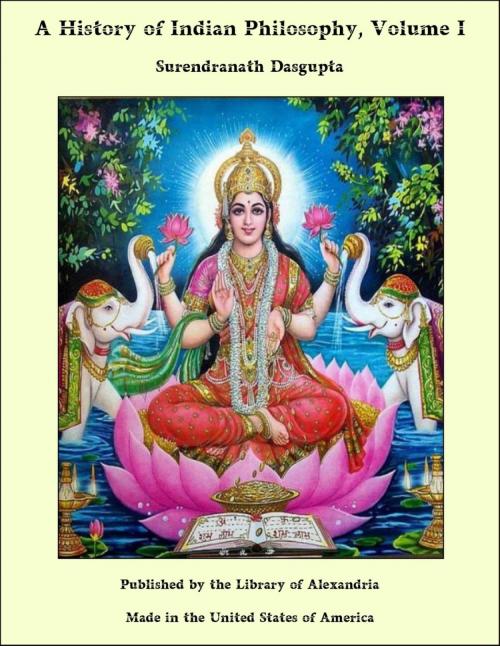A History of Indian Philosophy, Volume I
Nonfiction, Religion & Spirituality, New Age, History, Fiction & Literature| Author: | Surendranath Dasgupta | ISBN: | 9781613102381 |
| Publisher: | Library of Alexandria | Publication: | March 8, 2015 |
| Imprint: | Language: | English |
| Author: | Surendranath Dasgupta |
| ISBN: | 9781613102381 |
| Publisher: | Library of Alexandria |
| Publication: | March 8, 2015 |
| Imprint: | |
| Language: | English |
The old civilisation of India was a concrete unity of many-sided developments in art, architecture, literature, religion, morals, and science so far as it was understood in those days. But the most important achievement of Indian thought was philosophy. It was regarded as the goal of all the highest practical and theoretical activities, and it indicated the point of unity amidst all the apparent diversities which the complex growth of culture over a vast area inhabited by different peoples produced. It is not in the history of foreign invasions, in the rise of independent kingdoms at different times, in the empires of this or that great monarch that the unity of India is to be sought. It is essentially one of spiritual aspirations and obedience to the law of the spirit, which were regarded as superior to everything else, and it has outlived all the political changes through which India passed. The Greeks, the Huns, the Scythians, the Pathans and the Moguls who occupied the land and controlled the political machinery never ruled the minds of the people, for these political events were like hurricanes or the changes of season, mere phenomena of a natural or physical order which never affected the spiritual integrity of Hindu culture. If after a passivity of some centuries India is again going to become creative it is mainly on account of this fundamental unity of her progress and civilisation and not for anything that she may borrow from other countries. It is therefore indispensably necessary for all those who wish to appreciate the significance and potentialities of Indian culture that they should properly understand the history of Indian philosophical thought which is the nucleus round which all that is best and highest in India has grown. Much harm has already been done by the circulation of opinions that the culture and philosophy of India was dreamy and abstract. It is therefore very necessary that Indians as well as other peoples should become more and more acquainted with the true characteristics of the past history of Indian thought and form a correct estimate of its special features.
The old civilisation of India was a concrete unity of many-sided developments in art, architecture, literature, religion, morals, and science so far as it was understood in those days. But the most important achievement of Indian thought was philosophy. It was regarded as the goal of all the highest practical and theoretical activities, and it indicated the point of unity amidst all the apparent diversities which the complex growth of culture over a vast area inhabited by different peoples produced. It is not in the history of foreign invasions, in the rise of independent kingdoms at different times, in the empires of this or that great monarch that the unity of India is to be sought. It is essentially one of spiritual aspirations and obedience to the law of the spirit, which were regarded as superior to everything else, and it has outlived all the political changes through which India passed. The Greeks, the Huns, the Scythians, the Pathans and the Moguls who occupied the land and controlled the political machinery never ruled the minds of the people, for these political events were like hurricanes or the changes of season, mere phenomena of a natural or physical order which never affected the spiritual integrity of Hindu culture. If after a passivity of some centuries India is again going to become creative it is mainly on account of this fundamental unity of her progress and civilisation and not for anything that she may borrow from other countries. It is therefore indispensably necessary for all those who wish to appreciate the significance and potentialities of Indian culture that they should properly understand the history of Indian philosophical thought which is the nucleus round which all that is best and highest in India has grown. Much harm has already been done by the circulation of opinions that the culture and philosophy of India was dreamy and abstract. It is therefore very necessary that Indians as well as other peoples should become more and more acquainted with the true characteristics of the past history of Indian thought and form a correct estimate of its special features.















